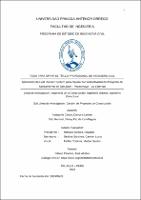| dc.contributor.advisor | Gálvez Paredes, José Alcides | |
| dc.contributor.author | Azabache Castro, Damaris Leonor | |
| dc.contributor.author | Ortiz Remotti, Vhany Paz de los Milagros | |
| dc.creator | Azabache Castro, Damaris Leonor | |
| dc.date.accessioned | 2023-11-22T14:07:39Z | |
| dc.date.available | 2023-11-22T14:07:39Z | |
| dc.date.issued | 2023 | |
| dc.identifier.uri | https://hdl.handle.net/20.500.12759/11571 | |
| dc.description.abstract | El presente informe de tesis tiene como finalidad la aplicación de la
herramienta Last Planner System en la productividad del proyecto de Saneamiento
del Distrito de San José, Pacasmayo – La Libertad. Actualmente, la mayoría de los
proyectos aprobados en nuestro país no se logran ejecutar por completo ni cumplen
con los plazos establecidos, lo cual genera retrasos y contratiempos durante la
ejecución de obra. Es por ello que, la presente investigación, busca aplicar la
metodología Last Planner System como herramienta para mejorar la productividad
del proyecto de Saneamiento descrito anteriormente. Durante el desenvolvimiento
de la investigación, se precisarán los conceptos y etapas a seguir para implementar
la herramienta Last Planner System. Comenzamos con la Sectorización del
proyecto y cálculo del tren de trabajo para cada una de las partidas en función de
sus cuadrillas y rendimientos correspondientes, paso primordial que nos servirá de
base para llevar a cabo el Tren de Actividades, Programación Intermedia y
Programación Maestra. Culminadas estas etapas, procedemos al análisis de los
datos previamente recolectados del expediente técnico donde se pudo inferir que;
mediante la aplicación de la herramienta Last Planner System se logró reducir dos
variables importantes: tiempo y costo, lo cual conlleva al mejoramiento de la
productividad del proyecto. Finalmente, obtuvimos nuestras conclusiones y
recomendaciones que será de interés para colegas venideros que deseen aplicar
esta herramienta en sus proyectos | es_PE |
| dc.description.abstract | The purpose of this thesis report is the application of the Last Planner System
tool in the productivity of the San José District Sanitation Project, Pacasmayo –
La Libertad. Currently, most of the projects approved in our country are not fully
executed nor do they meet the established deadlines, which generates delays and
setbacks during the execution of the work. That is why this research seeks to apply
the Last Planner System methodology as a tool to improve the productivity of the
Sanitation project described above. During the development of the investigation, the
concepts and stages to follow to implement the Last Planner System tool will be
specified. We begin with the Sectorization of the project and calculation of the work
train for each of the items based on their crews and corresponding yields, an
essential step that will serve as the basis for carrying out the Train of Activities,
Intermediate Programming and Master Programming. Once these stages are
completed, we proceed to the analysis of the data previously collected from the
technical file where it could be inferred that; Through the application of the Last
Planner System tool, it was possible to reduce two important variables: time and
cost, which leads to the improvement of the project's productivity. After the analysis,
we obtained our conclusions and recommendations that will be of interest to future
colleagues who wish to apply this tool in their projects | es_PE |
| dc.description.uri | Tesis | es_PE |
| dc.format | application/pdf | es_PE |
| dc.language.iso | spa | es_PE |
| dc.publisher | Universidad Privada Antenor Orrego | es_PE |
| dc.relation.ispartofseries | T_CIVIL_2338 | |
| dc.rights | info:eu-repo/semantics/openAccess | es_PE |
| dc.rights.uri | https://creativecommons.org/licenses/by/4.0/ | es_PE |
| dc.source | Universidad Privada Antenor Orrego | es_PE |
| dc.source | Repositorio Institucional - UPAO | es_PE |
| dc.subject | Last Planner System | es_PE |
| dc.subject | Producividad | es_PE |
| dc.subject | Saneamiento | es_PE |
| dc.title | Aplicación de Last Planner System para mejorar la Productividad del Proyecto de Saneamiento en San José – Pacasmayo – La Libertad | es_PE |
| dc.type | info:eu-repo/semantics/bachelorThesis | es_PE |
| thesis.degree.level | Título Profesional | es_PE |
| thesis.degree.grantor | Universidad Privada Antenor Orrego. Facultad de Ingeniería | es_PE |
| thesis.degree.name | Ingeniero Civil | es_PE |
| thesis.degree.discipline | Ingeniería Civil | es_PE |
| dc.subject.ocde | https://purl.org/pe-repo/ocde/ford#2.01.00 | es_PE |
| renati.advisor.orcid | https://orcid.org/0000-0002-2100-4241 | es_PE |
| renati.author.dni | 70824572 | |
| renati.author.dni | 73076850 | |
| renati.advisor.dni | 18217072 | |
| renati.type | https://purl.org/pe-repo/renati/type#tesis | es_PE |
| renati.level | https://purl.org/pe-repo/renati/level#tituloProfesional | es_PE |
| renati.discipline | 732016 | es_PE |
| renati.juror | Hurtado Zamora, Oswaldo | |
| renati.juror | Geldres Sánchez, Carmen Lucía | |
| renati.juror | Farfán Córdova, Marlon Gastón | |
| dc.publisher.country | PE | es_PE |





